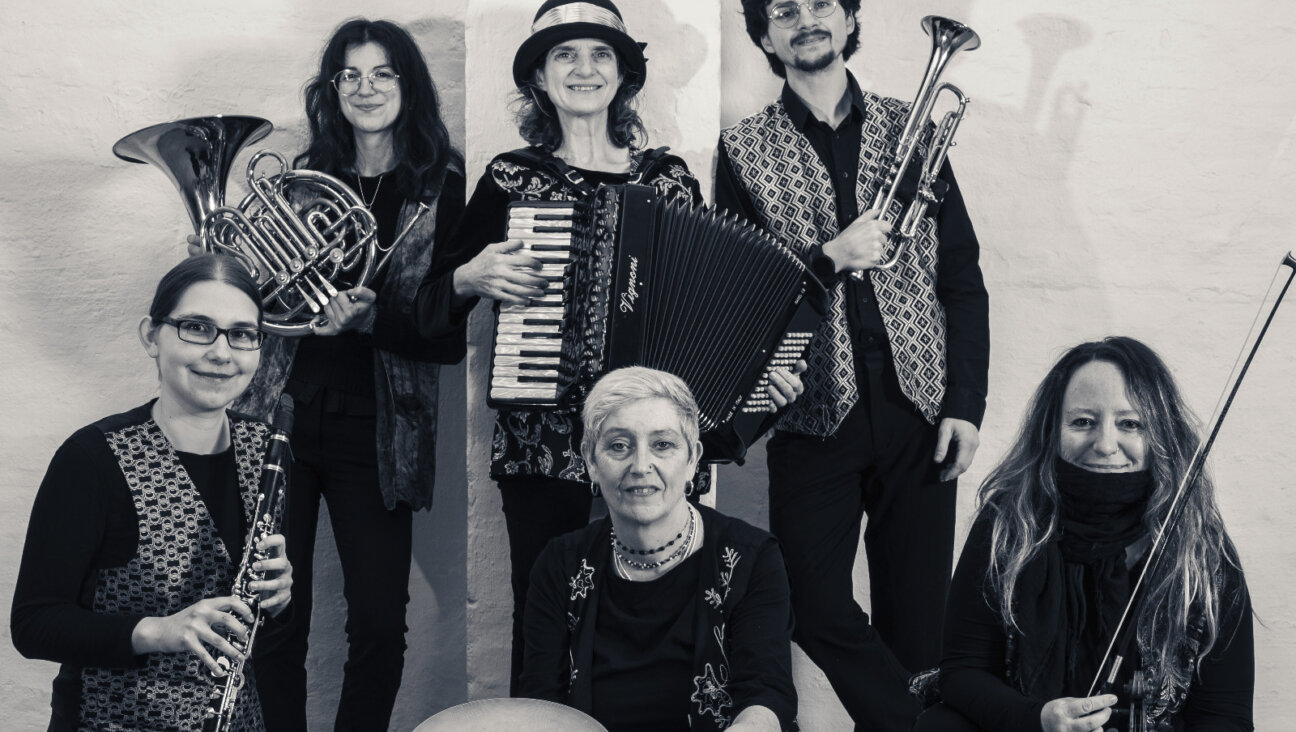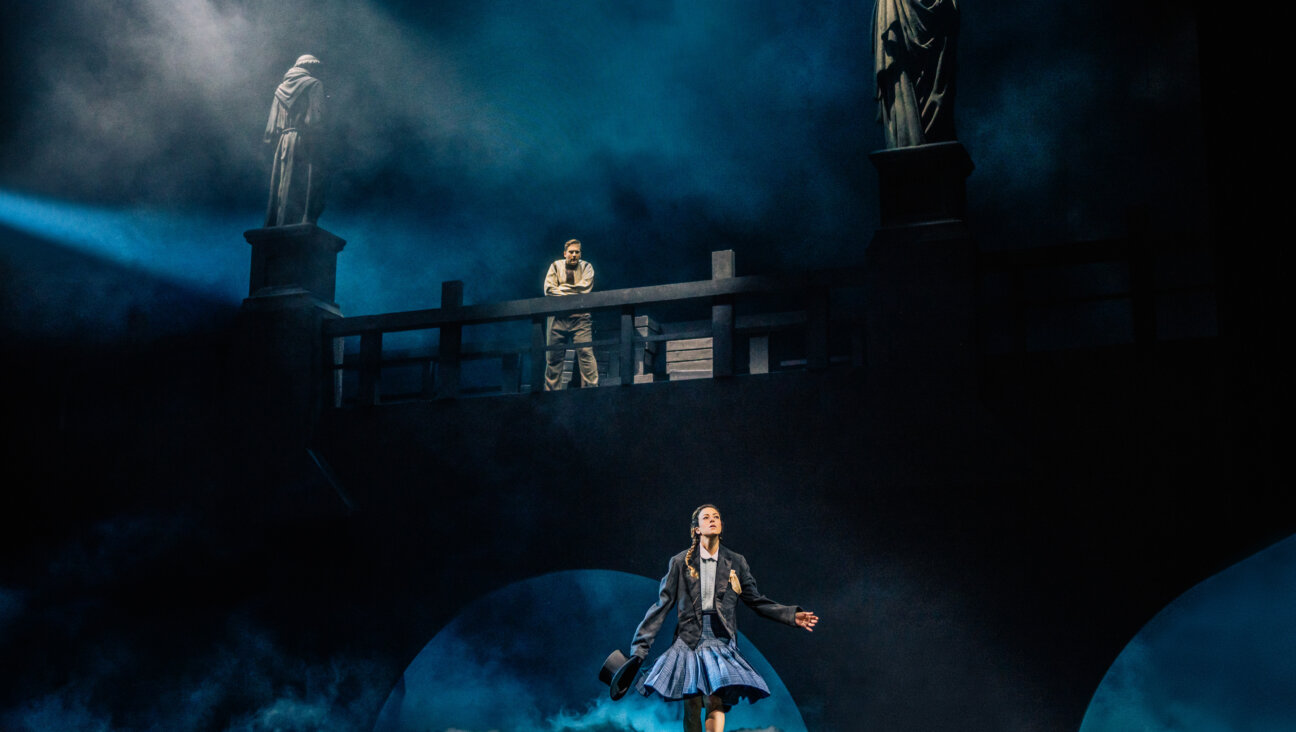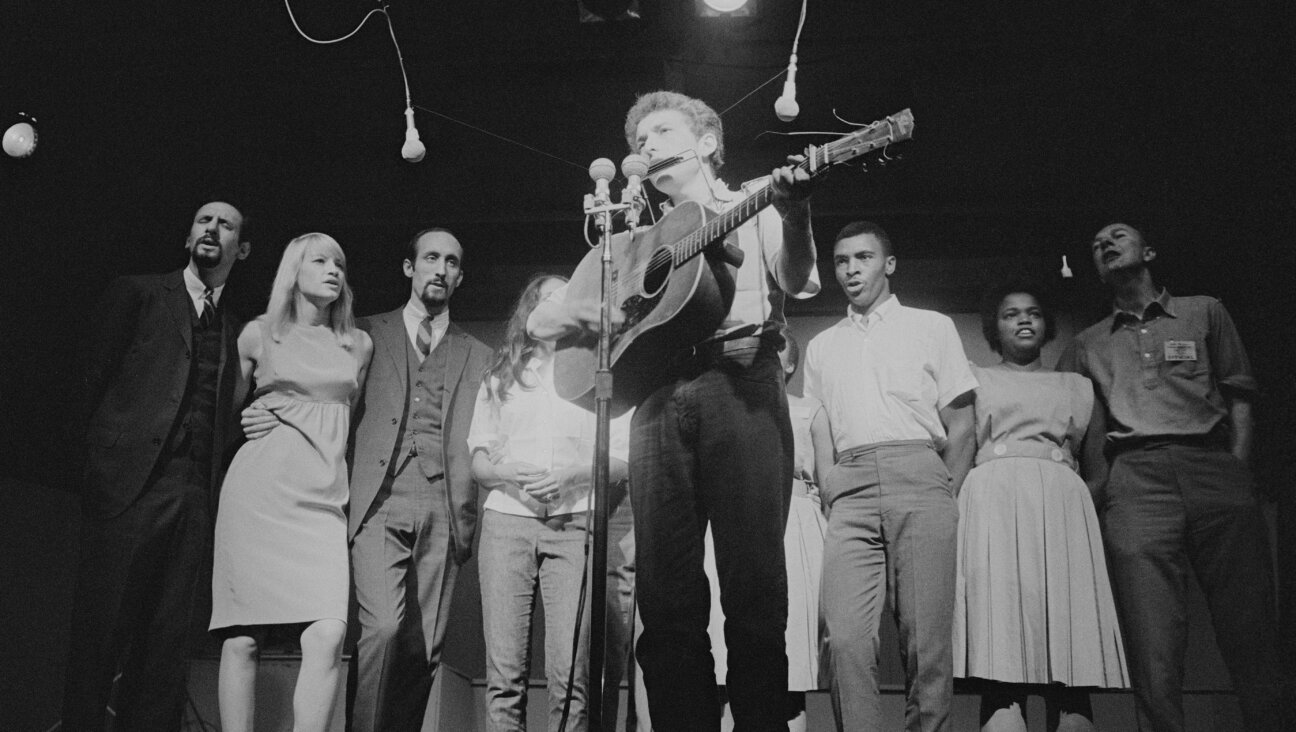George Wein Remembers Newport — 50 Years After Bob Dylan Went Electric

Image by Getty Images
George Wein, co-founder of the Newport Jazz Festival, once wrote, “If there was ever an average middle-class, Jewish-American kid… I was it.” But the life that followed Wein’s childhood in the Boston suburbs has been anything but commonplace.
Consider a few facts:
As a teenager who hungrily sought out live jazz, Wein sometimes brought musicians home with him for late-night meals and jam sessions. “Picture a carload of Negro jazz musicians in 1943 driving through our slumbering suburb after midnight and playing music there until the early morning hours,” he wrote in his 2003 memoir. “This sort of thing just didn’t happen in Newton, Massachusetts.”
In the 1940s, Wein enlisted in the Army, where he bounced between stateside bases before being shipped over to Europe. He was heading ever closer to the German front lines in 1945, when he learned of Hitler’s death. A few months later he was in a tent city in a French village, awaiting deployment to the Pacific, when the Japanese surrendered. He collapsed in relief, weeping.
In a 1954 New Yorker article on the jazz festival’s debut, reporter Lillian Ross described Wein as a “stocky man of twenty-eight who seemed to be filled with controlled frenzy.” “This town will never be the same again,” Wein told Ross. “We could make Newport the jazz center of the world. What Salzburg is to Mozart! What Bayreuth is to Wagner! What Tanglewood is to classical music!”
Wein’s festival not only succeeded, but sometimes over-succeeded. In 1960, Newport was jammed with so many rowdy, beer-soaked young folks (many of whom were forced to sleep on the beach in the rain, due to a lack of hotel rooms) that the National Guard was called in to quell riots. Unrest returned again in 1971, when hordes of young fans trampled a fence and took to the stage to smash light fixtures, toss chairs, rip the lid off a piano and light sheet music on fire.
Wein has received an array of accolades, including a Commandeur de L’Ordre des Arts et Lettres from France, lifetime achievement awards from DownBeat magazine and York College of the City University of New York, a Patron of the Arts Award from the Studio Museum of Harlem and a “Jazz Master” distinction from the National Endowment for the Arts. In 2001 the famed critic Nat Hentoff wrote that Wein has “expanded the audience for jazz more than any other promoter in the music’s history.”
In February 2015, during the Grammy Awards in Los Angeles, the host of the show paused to recognize Wein, who had recently received a Grammy Trustees Award. “More than anyone, George set the stage for what great festivals today look like,” the rapper/actor L.L. Cool J told thousands in the audience, and millions of TV viewers. “Festivals like Coachella, Bonnaroo — he made this possible. George is 89 years young and strong and still playing piano beautifully.”
Indeed, Wein’s life is so stunningly nonaverage that it’s surprising he hasn’t been the subject of a Hollywood biopic. And if that film ever is produced, the first few scenes will be pretty Jewish.
Wein’s household wasn’t intensely observant — “I grew up thinking that shrimp and lobster were kosher,” he once said — but his father, Barnet Wein, a doctor, took pride in being able to converse with his patients in Yiddish. And Ruth Wein, George’s mother, insisted that both he and Larry Wein, his brother, have bar mitzvahs. In his memoir, Wein describes his elementary school in Newton as a “cultural cocoon” that was “probably 95 percent Jewish.”
The turning point in Wein’s life came in 1953. He had returned safely from the war and launched a jazz club in downtown Boston called Storyville. Later, he was approached by a jazz-buff Boston University professor and Elaine Lorillard, a Newport socialite and the wife of the tobacco-fortune heir Louis Lorillard. The professor explained that Ms. Lorillard was interested in bringing live jazz to Rhode Island’s posh seaside town, and Wein would make a fitting producer.
“I had no rulebook to go by,” Wein wrote of his approach to programming the event. “I knew it had to be something unique, that no jazz fan had ever been exposed to. I remembered my nights in New York City when I had started off in Greenwich Village at 8 p.m., gone to Harlem, and ended up seven hours later at 52nd Street… I heard Dixieland, big bands, swing, unique singers, and modern jazz. If this is what I loved, then that was what should appeal to any jazz fan.”
The bill for the July 1954 inaugural Newport Jazz Festival included traditional jazz, freeform jam sessions, panel discussions on “The Place of Jazz in American Culture” and performances by Billie Holiday, Dizzy Gillespie, Oscar Peterson, Gerry Mulligan and Ella Fitzgerald. The rave reviews poured in, including one from The Providence Journal, which read, “To say the whole affair was a success is a considerable understatement.” In ensuing years, the fest became such a smash that in 1959, Wein launched a second event dedicated to folk music, with the help of Pete Seeger and his wife, Toshi Seeger.
The list of performers who have appeared onstage at those two festivals is staggering. Ray Charles. Janis Joplin. Frank Sinatra. Joni Mitchell. Leonard Cohen. Louis Armstrong. John Coltrane. Joan Baez. Thelonious Monk. Nina Simone. Chuck Berry. Aretha Franklin. Al Green. The 1969 jazz fest alone featured Led Zeppelin, Anita O’Day, Jethro Tull, Miles Davis, Sly and the Family Stone, James Brown, Herbie Hancock, Dave Brubeck, and Frank Zappa and The Mothers of Invention.
In some cases, Newport gigs have defined careers. After Duke Ellington’s famous 1956 performance of “Diminuendo and Crescendo in Blue” (featuring a 27-chorus solo from saxophonist Paul Gonsalves) cured a professional slump, the legendary bandleader told people, “I was born at the Newport Jazz Festival on July 7, 1956.”
Then, of course, there was the moment when a brash, talented, Jewish folk singer from Minnesota took the stage in 1965 wearing a leather jacket and carrying a Fender Stratocaster. Bob Dylan’s plugged-in performance that day was a “dramatic declaration of independence, a symbol for a rebellious decade and a generation that did not want to succeed on their parents’ and teachers’ terms or succumb to the establishment,” Elijah Wald has written in his new book, “Dylan Goes Electric!: Newport, Seeger, Dylan, and the Night That Split the Sixties.” “What happened… was not just a musical disagreement or a single artist breaking with his past. It marked the end of the folk revival as a mass movement, and the birth of rock as the mature artistic voice of a generation.”
Who was waiting for Dylan when he exited the stage?
George Wein, who implored him to go back and play an acoustic number, in order to stave off a riot. Dylan ultimately agreed, and, with a borrowed guitar, performed, “It’s All Over Now, Baby Blue.” This year’s folk festival marks 50 years since that fateful day. And among the scheduled performances is a set from a secret lineup of musicians playing as “’65 Revisited.” Not so secret is the fact that Wein will be in attendance (and at the jazz festival the following weekend), riding around in his signature golf cart, nicknamed the “Wein Machine.”
Posters from bygone jazz festivals line the walls of the hallway leading to Wein’s apartment, in his building on Manhattan’s Upper East Side. When I visited on a recent afternoon, I was greeted at the door by one of the young employees who spend weekdays there. Since the passing of Wein’s wife of 46 years, Joyce Wein, in 2005, his apartment has been headquarters for Newport Festivals Foundation Inc., the not-for-profit organization that runs the jazz and folk festivals. Wein remains its chairman.
Wein’s apartment is a kind of holy pilgrimage site for jazz musicians. I was ushered through a foyer and into a spacious living room, where Wein’s Grammy award sat on a coffee table. In a corner was a grand piano that, as Wein told me when he entered the room, had been played by a host of stars, including John Lewis, the late musician director of the Modern Jazz Quartet; Jon Batiste, the young phenom recently named bandleader of “The Late Show With Stephen Colbert,” and Joey Alexander, the 11-year-old Indonesian prodigy performing at this year’s Newport Jazz Festival.
Six decades have passed since The New Yorker’s Ross marveled at Wein’s energy. And that “controlled frenzy” doesn’t seem to have diminished significantly. “I go out and listen to music all year long,” Wein told me when describing how he hand-picks each artist who performs at the jazz fest. He spends much of the rest of his time writing emails, meeting with the festival foundation’s board and posting mini-essays on Facebook and talking to journalists. “When you get to be 90 years old, a lot of people want to talk to you,” he said with a laugh. During our visit, Wein was soft-spoken but ebullient. He told me about the time he produced a concert that paired a cantor and blues musician. (“It could have been a great concert, but it didn’t work.”) He talked about how he views flagging record sales for jazz albums as a positive thing. (“It sells records like classical music sells records… [and] everybody considers classical music great music.”) He told me how — after stints as a manager, record executive and piano player — he identifies as a producer. (“I’m an impresario. I create events.”)
The life of an 89-year-old music-business legend, it seems, is sprinkled with a greater-than-usual number of joys and sorrows. Follow Wein on Facebook, and you’ll see how frequently he writes about friends and acquaintances who have passed away. (The past few months have brought tributes to B.B. King, Lew Soloff, Ornette Coleman and the folk singer Jean Ritchie.) And as we chatted, he told me that due to hearing loss, he recently stopped playing piano. “I have a sound in my head that I’m looking for,” he said. “When I play… I don’t get that sound.”
But Wein doesn’t dwell on bad news. And he was soon gushing about how, last June, the American Society of Composers, Authors and Publishers inducted him into its Hall of Fame, where he joins the company of Louis Armstrong, Benny Goodman and Jelly Roll Morton. A few months earlier he traveled to New Orleans to cut the ribbon on the George and Joyce Wein Jazz & Heritage Center. “That meant a lot to me, because I was married to an African-American woman,” he said. “And we were married before the Civil Rights [Act] was passed, and the first time I went to New Orleans I couldn’t bring my wife. And now you see our names up there, right there on Rampart Street.”
The themes that arose most prominently in our conversation were respect and pride. For much of his life, Wein told me, he sought the kind of esteem that came naturally to a physician like his father: “Everybody respected Dr. Wein. I wanted that same respect, and I worked very hard for it.
“I’m proud of the fact that I think everybody that’s involved with jazz has more respect, and I think that I’m very much a part of that.” He pointed to the existence of Jazz at Lincoln Center, and to the fact that, nowadays, parents don’t balk if a teenager aspires to a career in jazz. (More evidence: The Newport Festivals Foundation’s gala, in August, will be co-chaired by two U.S. senators and by Rhode Island’s governor, Gina Raimondo.) “And I’m proud that I made my own way,” he added. “I wasn’t copying people along the way. I kept thinking of unique approaches and then made them work.”
In other words, he improvised.
What better way to describe a life of jazz?
Philip Eil is a freelance journalist based in Providence, RI. He is the former news editor of the Providence Phoenix.
















